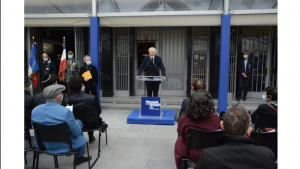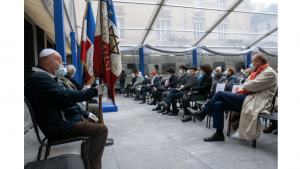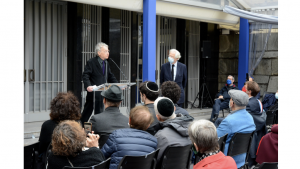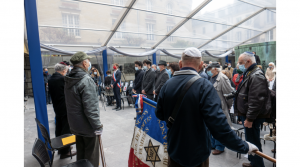Hazkarah ceremony: speech by Pierre Birnbaum
On September 27, 2020, at the Shoah Memorial in Paris.
Commemoration dedicated to the memory of the unburied victims of the Shoah.
Transcription of the speech by Pierre Birnbaum, historian and sociologist.
September 27, 2020
Mr. President,
It is with immense restraint that I would like to take the floor today to respond to the unexpected invitation that honors me and greatly disturbs me about the officials of the Memorial.
In a week, our history as well as, for some still present here, our memory, will be confronted with a date that remains essential, the eightieth anniversary of the status of the Jews on October 3, 1940. The Shoah, which we commemorate today as every year, certainly does not begin in France with the publication of this text. In itself, it does not provoke any anti-Semitic mobilization, does not provoke any round-up, does not lead implacably to tragic deportation, almost encounters only indifference. This text, which defines the Jew in terms of race and not religion, radically excludes them from public space since it decrees in its article 2 that "access to and exercise of the public functions and mandates listed below are prohibited for Jews". On the same day, another law in its article 1 simply states that "foreign nationals of Jewish race may, from the promulgation of this law, be interned in special camps by decision of the prefect of the department where they reside", putting an end to the Popular Front’s more open policy towards foreigners. It succeeds the law of 22 July which revised the naturalizations obtained since the liberal law of 10 August 1927 and which particularly targeted foreign Jews who thus became stateless. Taking up the old slogan of Edouard Drumont, Le Temps, the most respected daily newspaper of the time, the spokesman of liberal and republican France launches, on July 25, 1940, denying its values, finally «La France aux Français»!
Thus, remembering today in the specific context of the 80th anniversary of the Statute of the Jews takes a particular turn here in Paris, where suddenly the destiny of all the Jews of France is turned upside down. D'un trait de plume is erased a century and a half of exceptionalism by the brutal questioning of the French integration of Jews within the public space. The counter-revolution that triumphs has never accepted the message of '89, it has always refused the integration of the Jews into the nation decided by the vote of September 1791 and, throughout the 19th century, it mobilized in the name of an exacerbated nationalism, of a conception of race or even of a vengeful Catholicism sung by the greatest such as Maurice Barrès.
This counter-revolution won the support of the popular masses: it even almost imposed its extreme ideologies during the anti-Semitic moment par excellence that is the Dreyfus affair which saw immense angry crowds parade through the cities of France screaming, 'Death to the Jews'. A case that could only take place in France since it is only in France that emancipated Jews were able to reach the top of the state in large numbers thanks to republican meritocracy.
In this sense, to make a long story short, the Statute of the Jews of October 1940 is virtually present in the hateful claims of an Edouard Drumont and his acolytes whose main slogan is to eliminate all Jewish presence. Edouard Drumont, always himself, invents this political anti-Semitism which will spread elsewhere, as in the Weimar Republic when at last the Jews will accede to the State, arousing Hitler’s fury against this State considered as discredited that he swears to destroy.
Is it therefore appropriate to hear the warning of Stefan Zweig who, in December 1938, faced with the Nazi threat, advised the Jews to avoid "occupying a position of high command and decision-making in public and political life", never to appear «in the first place, the most visible» of the State in order not to feed anti-Semitic passions? Doesn’t this lesson particularly concern French Jews who are crazy about the state? Should they, yesterday as today, move away from the state, live far from power within civil society? Even worse, in a radical way, should they pay more attention to the warning that Yitzhak Baer, the great Israeli historian, formulated as early as 1936 and which he reaffirmed in 1947, considering that 'exile (the galout) is and will remain a political enslavement that must be entirely abolished', an enslavement which would be all the more complete if it takes place within a strong state like that of France where the Jews, according to Baer’s word, 'occupy the forefront'?
As if to confirm this judgment, the statute of October 1940 gives the Holocaust, I repeat it, a truly French dimension since this text stated certainly in the presence of the Nazi occupier but in complete autonomy marks the denial of the logic of the State which turns against its Jews with all the force it has due to its long history. If France does not invent fascism, it indeed generates political antisemitism directed against this state supposedly subservient to the Jews. In itself, the statute of October 1940 obviously does not involve Compiègne, Pithiviers, les Milles, Gurs and so many other camps, the round-ups of July and August 42, the hunts for 43 and 44, Drancy, the fatal deportation of 73,000 Jews, both French and foreign. In October 1984, President François Mitterrand dared to assert that this status concerned only foreign Jews who were obviously not concerned at all as if he was thinking of making this iniquitous decision more acceptable. This statute nevertheless prepares the rejection of public space and its fatal consequences, and it is hard to understand since so many historians perceive the period known as the marechalist before mid-1942 as a moment of "ambivalence" that would be out of question to judge severely.
The high civil service, once republican in an almost unanimous denial and still today incomprehensible, does everything possible to apply this statute as scrupulously as possible. Despite their protest addressed to the head of state, it distances the Jewish colleagues from their state. When, later in his speech at Auschwitz on 27 January 2005, President Jacques Chirac evoked the figures of Charlotte Delbo and the women from the convoy of 24 January 1943, Georgy Halpern, a child of Izieu who died at Auschwitz, and communist activist Jean Lemberger, of Sarah and Hersch Beznos and their children and grandchildren deported without return, he also states that "with the emblematic figure of Pierre Masse, here arise these 'crazy Jews of the Republic'. Pierre Masse, from Lorraine, lawyer, fighter of the Great War, parliamentarian, minister, writes, before dying gassed on his arrival: "I will end up as a soldier of France and of the law that I have always been." Deputy and senator under the Third Republic who was also Undersecretary of State for War during the First World War, Masse embodies these State Jews devoted to the nation but abandoned in October 1940 by the public authorities and all the more shocked as they put all their passion at the service of this State, not imagining that they could suddenly be excluded as if this absolute trust made even more inconceivable a tragic fate that will frequently strike them.
From July 1986 until the great speech of July 16, 1995, President Chirac was the first head of state to highlight the betrayal of the State by the regime of Marshal Pétain, a state henceforth at 'hands of the dark forces... who insinuated themselves up to the summits of the State", thus evoking the presence in France of "Vichy before Vichy", which will be highlighted in turn by President Emmanuel Macron declaring, on July 17, 2017, during the commemoration of the Vel d'Hiv roundup that "the Dreyfus affair had showed the virulence" of antisemitism and racism that comes back identical to itself with Vichy in "la France de I am everywhere, of Bagatelles for a massacre ».
; from then on, for Emmanuel Macron, just as for Jacques Chirac, Vichy, 'it was the government and administration of France', henceforth dominated by the «dark forces» to which the State submits itself.
The prefects, pillars of the republican state whose immense majority remains in office, thus lead the hunt as I could realize by making myself a historian. Born French a few months before the October Statute by declaration of parents both immigrants from Poland and Germany, I am excluded long in advance from the public service and the republican meritocracy. By consulting, as a historian, the numerous national archives of the Commissariat for Jewish Affairs, the National Archives or even the local archives of the Hautes Pyrénées where we are refugees, my family and I, I learn that so many official texts designate me-even as an actively sought-after Jewish child, sometimes French, sometimes Polish, who should be arrested with his own. The police reports follow one after another, testifying to the relentlessness of the police in arresting us during the roundups of August 1942 or those of 1943, their decision to intern my father at the camp of Noe, and their tireless determination to deport us. Moreover, we will never know how many Jewish children of foreign origin but born French have been deported as foreigners. My parents hide, miraculously avoid arrest many times, place my sister and me in multiple unwelcoming institutions before confiding to a couple of peasants from Omex, a small Pyrenean village.
None of these prefects will be arrested or dismissed after the Liberation due to their participation in the hunt for Jews. No official shall be imprisoned or dismissed for the sole reason of having conducted the hunt for the Jews. No prefect and almost no high official will be part of the French Righteous who come mainly from civil society and, in particular, from the clergy or the world of small peasants in remote countryside. While the archives testify to the zeal deployed by the prefect and the police hierarchy to find the trace of my family as well as mine, named in quantities of dispatches and administrative documents, it is Pyrenean farmers who hide us, my sister and I, several years, who act like the Righteous, protect us, love us, and I remained faithful to them until the end of their existence.
Beyond France, the comparative analysis of the Shoah from one country to another according to religious beliefs, economic backwardness, the dimension of the social or cultural crisis and so many other variables remains unfinished: it remains so complex that it seems impossible. The Shoah by its uniqueness cannot be simply included in the category of genocides. It seems to escape any form of historical explanation: neither Christian anti-Judaism, nor traditional antisemitism with its prejudices, nor even biological racism, and even less anti-modernism or the crisis of the 1930s, its unemployment, the resentment of the middle classes, the loss of landmarks, the crisis of democracies, the terror established by Bolshevism or even the demented and extraordinary personality of Hitler cannot apprehend the radical shift of the world that it symbolizes. If the Jewish philosophers, writers, artists remain as haunted by the Shoah, the great historians of modern Judaism often seem, on the contrary, paradoxically avoid devoting their work to the extermination of the Jewish people by prioritizing the so-called normal history of previous periods made as much of happiness as disillusionment, avoiding emphasizing only the periods of misfortune, favoring «History without tears». From Salo Baron to Cecil Roth, from Jacob Katz to Yosef Yerushalmi, they prefer to study the way in which the Jews maintained their community structures, their forms of sociability and creativity in their daily existence, the way they came out of the ghetto to face the challenges of assimilation while preserving their orthodoxy and loyalty to Sion or even, to understand the challenges and ambiguities of the royal alliance, the vertical alliance between the Jews and the State, undermined by the Kings themselves. In this sense, for a long time they, like their students all over the world, almost avoided teaching about the Shoah; they even frequently refused that their students devote their research to this event which seems as if it had remained unthinkable.
Even today, his teaching as well as the major studies devoted to him are frequently conceived outside the history departments and even the Jewish history departments as if it were a disaster which, by its dimension and even, its nature, escapes the rules of the historical method. The scientific articles that concern her are most often published in specialized journals, while the major journals of Jewish history give the Holocaust only a measured place. It is that it radically differs from the time of the ghetto, from the litany of pogroms or even from antisemitic mobilizations: the resilience shown by the Jews throughout their history, mutual aid, solidarity, recourse to the royal alliance, the traditional strategies to confront hatred are this time proving to be irrelevant, obsolete, powerless. And above all, for many Jewish historians, the Shoah must not lead to a retroactive reading of history, imposing a lachrymal vision that would erase, in the diaspora, its inventiveness, its flourishing.
It is that at the time of the pogroms that punctuate 'normal' Jewish history made also of 'happiness' (Yerushalmi) followed the Holocaust, the massacre carried out by a state transfigured into an instrument of the forces of evil. In spite of all the criticisms that could be addressed to the monumental work of Raoul Hilberg who ignored the Holocaust by bullets and, in the vein of Hannah Arendt, wrongly accused the Jews of passivity, he rightly emphasized the essential role of the denatured state bureaucracy in the meticulous organization of the Holocaust. This observation applies all the more forcefully in France where the nation-state has imposed itself. When the State turns away from its logic to submit to the "forces of evil", the fate of the Jews takes a dramatic turn that is far more threatening than when they face popular anger alone. The rupture of the royal alliance with the State is all the more brutal because the strong French-style State has long been protective against anti-Semitic mobilisations and passions, and it effectively protected the Jews from the crowds unleashed at the worst moment of the Dreyfus Affair. Many still remember it in 1940 by showing themselves, wrongly, unshakably confident.
This betrayal by the State still resonates to our day. By its sole possibility, it still shapes the apprehension of our present-day history, raises legitimate concerns in the face of deadly attacks and antisemitic mobilizations, such as, in January 2014, Day of Anger, of which Jews are still victims nowadays, when again one hears «Death to the Jews» in the streets of Paris shouted by rampageans wearing far-right insignia or proudly brandishing the quenelle.
In the face of new threats, the murders of Jewish citizens, of Ilan Halimi, the children of the Ozar Hatorah school, of Sarah Halimi at Mireille Knoll, the murderous violence that hits them in a privileged way like at the Hyper Casher at the Porte de Vincennes when Amedy Coulibaly, the assassin, declares, "You Jews love life too much... You are the two things I hate the most in the world: you are Jews and French" by thus wanting to brutally break the long marriage between France and the Jews, in the face of so many dangers, they must once again imagine a response, become actors in their own history, to think of their future, dialogue with the vital forces of the nation, attempt to protect themselves by innovative horizontal alliances that complement the old royal alliance with the State, finally stand up against any attack on their full and complete belonging to the nation.
Pierre Birnbaum








